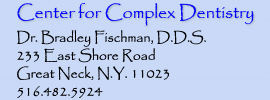 |
 |
For the Head and Neck Patient
Radiation Therapy to the head and neck requires special attention not needed in other parts of the body. Radiation is a form of light that is most destructive to cells with a large nucleus. Tumor cells have large nuclei and are therefore most effectively destroyed by radiation. Unfortunately, the salivary glands also have large nuclei, and when they are in the field of radiation, the quality and quantity of the saliva can change. Saliva has two primary functions, to lubricate the mouth and to protect the teeth from decay. Radiation induced decay occurs around the necks of the teeth and can proceed through the tooth with great rapidity.
Radiation therapy has a secondary effect of narrowing the blood vessels in its field. This means that areas of radiated bone may not have an adequate blood to cope with infection or surgical trauma. A tooth related infection or a necessary extraction could cause the loss of a large segment of bone due to the compromised blood supply. For this reason, prior to radiation therapy, it is important to have the status of your dentition reviewed; and determine if any teeth should be removed prior to radiation therapy, while the blood supply is still adequate to allow normal healing. Since there is an ideal time frame for starting radiotherapy following surgery, it is important to have any necessary dental work (extractions and eliminating areas of infection) completed as soon after surgery as possible.
Prior to radiation therapy we will also start you on topical fluoride therapy. Topical fluoride helps prevent the bacteria from adhering to the teeth, thereby reducing the chances of radiation induced caries.
Following the course of therapy, we will follow up on your salivary and dental status to determine the need for the continuation of Fluoride therapy, and/or specialized care. By six months after the completion of radiotherapy, salivary flow usually achieves its final level.
Strict home care, oral fluoride therapy, as well as frequent follow up, are necessary to help prevent the carious lesions caused by reduced salivary flow (radiation induced caries) and stop them before they cause root canal problems or loss of teeth.
To help prevent the destruction of the salivary glands, the radiotherapist will deliver the dosage via several different portals (directions) thereby concentrating the dosage at the tumor site and decreasing the dosage to the adjacent sites. In those cases where the salivary glands can't be spared, a dry mouth may occur (zerostomia). A dry mouth is a constant source of annoyance, but many of the symptoms can be reduced with increased fluid intake and artificial lubricants (some as simple as olive oil).
For more information, or to discuss your problems, please call the office (516.482.5924) and schedule an appointment with Dr. Fischman.
Dentures | Extreme Makeovers | Doctor's Credentials | Map & Policies | Contact Us
Home | Professional Referrals | Tidbits for Dentists | Newsletters for MDs